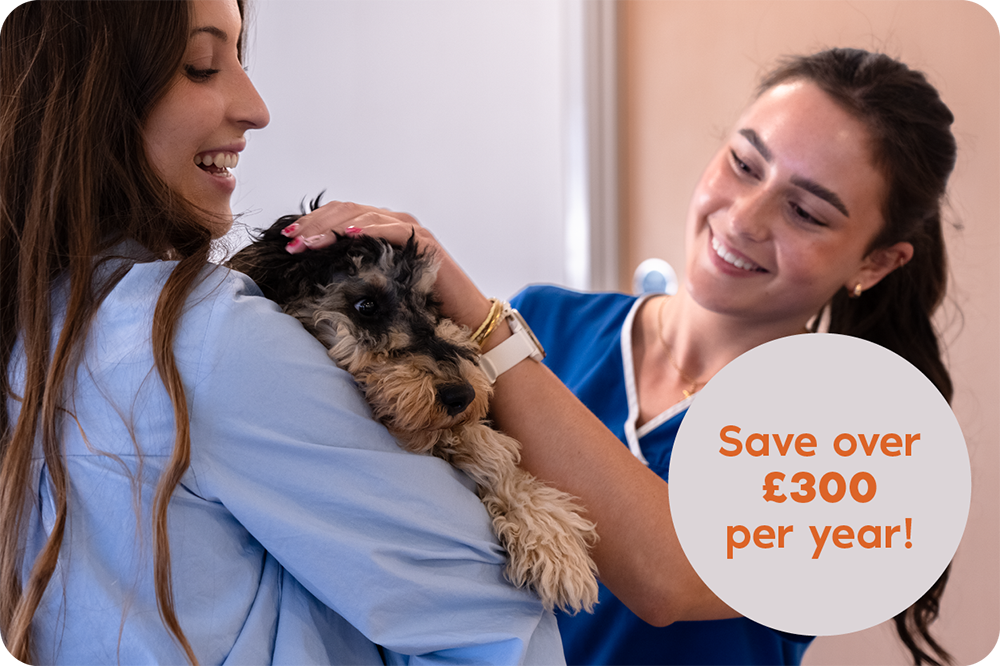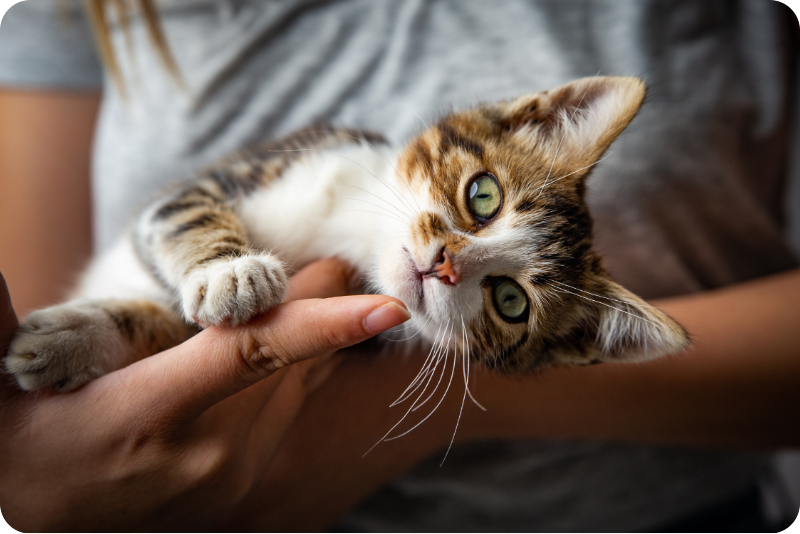Thinking about getting a puppy or just welcomed one into your home? We’re here to help.
Congratulations on your new furry friend! This page is designed to offer helpful tips and guidance for caring for your new companion. While it’s full of useful information, it’s not a substitute for speaking directly with one of our vets or nurses, so if you have any questions, please don’t hesitate to give us a call.
Quick Links
Getting Settled In
Getting a new puppy is a wonderful experience, but often when a puppy comes to its new home, it can be a stressful time for both you and the puppy! However, there are some things you can do to help them settle in quickly.
Establish a routine
Puppies will settle better in a household when there is a consistent routine. The most important part of this is keeping meal times and bed time the same, as a puppy will soon come to learn your daily routine and what is expected of them. After they have had their vaccinations, consistent walk times are also important.
Give them their space
Having a particular space set aside for a puppy to go when they want to be alone is important, especially if you have children in the house – puppies need space to rest and sleep. A crate, covered with a blanket or towel, can be useful to provide this. As a rule, a crate should only be the size that a puppy needs to comfortable sleep in it – any larger and you may find that they toilet in there, especially if you leave them in it overnight.
Food
Puppies should be fed on a diet that is appropriate for their age and eventual size. This food could be wet, dry, or a mix of the two. Look for a food that is labelled as “puppy” – there should be a feeding guide on the packet to indicate the age that the food is designed for. A small amount of other food (such as age-appropriate treats or cooked chicken) is fine for puppies to have occasionally, but the main part of their diet should be a balanced diet designed for their life stage.
If your puppy is going to grow up to be a large or giant dog (25kg or above as an adult) then ideally you should look for a food that is designed for large breed puppies, as they have slightly different nutritional requirements.
Initially, puppies should be fed 4 meals per day, as they find it much more difficult to keep their blood sugar levels high than adult dogs. This is particularly important for very small breeds such as Chihuahuas or Yorkshire Terriers. One they reach 12 weeks of age, they can normally be changed onto 3 meals per day, but if your puppy is very small then you may wish to check with your vet. They can go onto 2 meals a day at 5-6 months, if wanted.
Mealtimes
Regular mealtimes are important to get your puppy into a healthy routine. We do not recommend allowing puppies or adult dogs to graze on food that is down all the time, as this encourages over-eating. If they have not eaten a meal within half an hour, it should be taken away, and fresh food given next mealtime. They should not be given any extra food or treats as compensation. This will train them to eat regular, healthy meals.
Puppies should be taught to allow humans to take away food that they are eating. This is important to stop them becoming possessive over food, and will also help you if they start eating something that they should not. This can be taught by giving a puppy their food, and then picking up their food bowl part way through, holding it up for a minute or so, and then placing it down to allow them to finish.
Vaccinations
The initial vaccination course that your puppy receives is important to prevent them from getting potentially fatal diseases. Three of the diseases we vaccinate against (parvovirus, adenovirus and distemper) are viruses that puppies catch from other unvaccinated dogs, or places where unvaccinated dogs have been. The fourth , leptospirosis, is a bacteria that is carried by wildlife and wild rodents, and is most often found in ponds, puddles, ditches and rivers.
The vaccination course for puppies can be started from 8 weeks of age. It takes two injections, 4 weeks apart, to provide your puppy with ongoing protection. Puppies are not immune until 1 week after the second injection, so they could still get sick if they came into contact with a disease before then.
This protection then needs to be maintained with annual booster vaccinations, or your dog will become vulnerable again. If they do not receive a booster vaccination ithin 15 months of their last dose, their vaccination lapses, and they will need another course as though they were a puppy.
Kennel cough
The kennel cough vaccination is given into the nose. Only a single dose is needed, and protection lasts for a year. Vaccination does not prevent kennel cough in all cases—sometimes it means they will have mild symptoms than they otherwise would have. The vaccine also reduces how easily they may pass it on to other dogs. We recommend this vaccine for dogs that go into kennels, or do other activities that bring them into contact with lots of other dogs, such as showing or agility classes.
Microchipping
According to UK law, all puppies and dogs over 8 weeks of age must be microchipped, and the details help by the database company kept up-to-date. If you fail to do either of these you could be at risk of being fined if this was discovered by the authorities.
For puppies bred in the UK, microchipping should have been done by the breeder before they went to their new homes. Any dogs that have come in from abroad should also be microchipped as this is required for travelling to the UK.
If your are unsure as to whether or not your puppy is microchipped, we can scan them for you here at the practice. We are not required to report dogs who are not microchipped.
Flea and Worm Treatment
Worming puppies regularly is important as they are much more prone to develop infections than adult dogs. We recommend worming your puppy monthly until they are 6 months of age.
Puppies and young dogs are also at a higher risk of lungworm (Angiostrongylus Vasorum), a rare but nasty infection that causes coughing, breathing difficulties and a bleeding disorder, and can often be fatal. Treatment must be given monthly, and wormers bought “over the counter” (such as from pet shops, supermarkets, chemists, or online without a prescription) will not treat or prevent lungworm. To be sure that your worming protocol prevents lungworm, please speak to a vet or nurse.
Puppies are prone to picking up fleas as they are curious and often want to explore areas where wildlife may live. They may also pick up ticks in this way. A vet can discuss what treatment may be suitable for your puppy.
Insurance
Pet insurance has become increasingly popular over the last few years. Many different companies will offer policies, and some breeders may provide you with free insurance for the first few weeks. We recommend insurance as it provides a safety net should you pet suddenly become unwell or have an accident.
We cannot recommend a particular policy for you, but we suggest that you read any policy details that you are considering carefully. Some policies (often called “lifetime”) will cover your pet for the whole of their life; some will only cover them for a year. The total medical bills covered is also variable, so make sure to check carefully how much you can claim for.
Neutering
Many owners choose to neuter their dogs and there are health benefits that come with this; on average, neutered dogs live for longer than unneutered ones. This section gives an overview of the benefits and risk of neutering, but for more information please speak to your vet .
Spaying (female dogs)
Spaying can be done after the first season in small and medium breed dogs; for large and giant breed dogs they should be done after 1 year of age, which is usually after their second season.
The timing of spaying relative to a dog’s hormone cycle is important. The ideal time is 8-12 weeks after the end of a season, so if you are looking to get your dog spayed we recommend booking when your dog’s season ends (i.e. when they stop bleeding)
Benefits
- Stops their hormone cycle —Dogs will no longer experience seasons, with the associated bleeding and behavior changes.
- Removes the risk of pregnancy
- Removes the risk of pyometra—This is a womb infection common in older, unspayed females that is a life-threatening condition.
- Significantly reduces the risk of mammary cancer, if done after the first or second season.
Side-Effects
- Increased tendency to put on weight—We recommend reducing the amount of food you feed your dog after they are spayed, as obesity is common and can lead to other health conditions such as diabetes or cruciate disease.
- Increased risk of developing urinary incontinence—This is still uncommon, but spayed females are at a higher risk. It can usually be controlled with medication.
- May be a slightly increased risk of certain cancers
Castration (male dogs)
Castration should not be done before your dog’s skeleton has finished growing, as testosterone helps bones to develop. Your vet will advise you on the right age for your dog to be castrated.
Benefits
- Removes the risk of getting a female dog pregnant—There is a short period (up to 2 months) after castration where there is still the possibility of a pregnancy resulting from a mating.
- Removes the risk of testicular cancer—However, this is uncommon and usually benign
- Reduces the risk of an enlarged (non-cancerous) prostate that is prone to becoming infected
- Reduces the risk of perineal hernias
- May reduce some sexual behaviours – Humping or aggression may be reduced by neutering, especially if done when the dog under 1 year of age, but this is not always the case and should be discussed with a vet and/or behaviorist.
Side-Effects
- Increased tendency to put on weight—We recommend reducing the amount of food you feed your dog after they are castrated, as obesity is common and can lead to other health conditions such as diabetes or cruciate disease.
- May be a slightly increased risk of certain cancers
Early Training
Toilet Training
Initially, regular trips out into the garden (every few hours during the day) makes it easier for puppies to toilet in the right place. It is important to focus on rewarding puppies when they toilet correctly (either with praise or with a small treat); telling them off when they go in the wrong place is generally not very effective. Overnight, using a correctly sized crate can help to encourage them to “hold it in” until morning.
Socialisation
The first few weeks after your puppy comes home are the most important for getting them used to new things. This includes car journeys, small children, visits to the vet or groomer, and busy or crowded places. You should try and introduce your puppy to as many of these new experiences as possible. If they appear stressed, then you should remain calm and not give them any additional fuss as this will reinforce the idea that they should be stressed. It may take a few tries to get them used to new things.
During this time, puppies should also learn to interact with other dogs. We run puppy socialisation classes at our Bury St Edmunds branch, which is a great chance for them to learn how to interact and play. They can also meet other dogs, provided that those dogs are up-to-date with their vaccinations.
Biting and Nipping
Puppies will often try to play-bite or nip at you, especially when they are excited. They do this to try and get your attention, so the best way to train them to stop is to make sure they don’t get what they want! Even telling them off is a form of attention. The best thing to do when your puppy nips you is to put them down or walk away from them immediately, and ignore them for a minute or two. If they persist (such as trying to nip your ankles) then you may need to go into a different room. Normally, they quickly come to understand that playtime is over when they bite you, and so stop doing it!
If you have any questions or would like to discuss welcoming a new puppy into your home, don’t hesitate to get in touch. Our veterinary team is here to help you and your new family member. Find your local practice and call us or click here to book an appointment.
Find a Vet Practice Near You
Our Latest News and Advice

Join our Pet Healthcare Plan, the Kin Care Club.
Our comprehensive pet healthcare plan is designed to help you give your cat or dog the best care, while keeping your budget in mind.
Whether you’re looking for essential coverage or complete peace of mind, the Kin Care Club offers two flexible plans tailored to your needs and your pet’s well-being.




